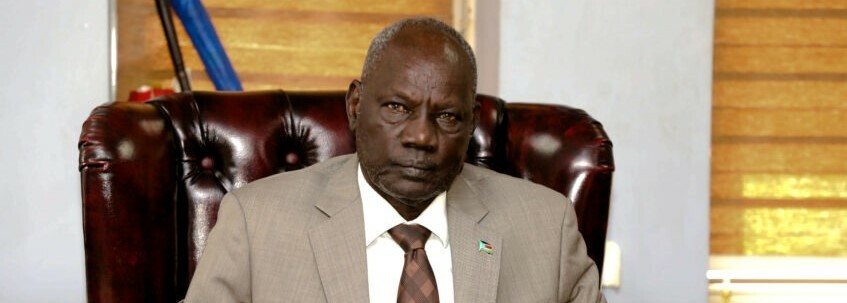There is a need to strengthen the judiciary to promote its independence, Information Minister Michael Makuei Lueth said on Friday.
Makuei also called for capacity-building programs for judges and their support staff, non-interference from other arms of the government and adequate funding to reform the judiciary.
He was speaking in Juba during the ongoing public hearing and consultations on the judicial reforms.
Minister Makuei said the constitution provides for independence of the judiciary and should be respected. He further said the independence of the judiciary is basically on paper and, therefore, requires actualization.
“We don’t need to interfere with the judiciary in decision-making. I was once a judge, and the judiciary’s independence means independence in decision-making. It should not be interfered with in decision-making; once interfered with, it is no longer independent,” he said.
He added, “To reform the judiciary is to review the Judiciary Act, build the capacity of the judges as well as the support staff of the judiciary because even if you have a competent judge but with an incompetent support staff, that judge will not perform his functions and duties well,” he said
“Those who handle cases until they come to the judges are very important people who must be properly trained so that they understand their jobs. A judge sits on his table, and the case is brought before him, presented, so if those who prepare those cases are not competent, then definitely the judge will be facing difficulty in performing his functions and duties.”
Makuei said the judiciary faces problems at the headquarters, including a lack of adequate space in the courts and an unconducive atmosphere to deliver its mandate.
Makuei added, “For the judiciary to continue existing, of course, we have the Supreme Court, the High Court, the County Courts and the lower courts up to the Customary Law Court. All these courts are there, but unfortunately, the courts are now operational as names, but they have no judges; this is one of the problems being faced by the judiciary; they need to have sufficient judges who can do the job.”
Hussein Abdel Bagi Akol, Vice President for Service Delivery Cluster, called for reforms in the judiciary and pledged support from the country’s top leadership.
“The judiciary of this country is important, key to our lives because it gives us peace. If the judiciary is strong, it means that we are using the judiciary to promote peace and security, and this is very key,” he said.
Lady Justice Joyce Aluoch, Deputy Chairperson for the Judiciary Reform Committee, cited the harmonization of the customary and the statutory courts as one of the greatest dilemmas facing the judiciary.
“One issue that is coming out and still very problematic is the customary law, and even this afternoon, both guests that we had discussed it. It is problematic because it is against women and girls who suffer a lot under the customary law,” she said.
“We should find ways of harmonizing customary and statutory laws, and some suggestions have been that let all the criminal issues go under the state laws and issues of families, marriages, and pregnancies come under customary law. It is still an issue that we have to discuss and make appropriate recommendations,” she added.
Justice James Ogola, Chairperson for the Judiciary Reform Committee, said they conducted consultations on the judiciary at the state level, where they spoke with chiefs, state officials, youths and women on their views on judiciary reforms before starting to consult top officials.
He said his team would incorporate views collected during a workshop at the end of the consultations, where representatives from various groups at the state and national levels would be presented with the final draft of the report.
“The next step will be to incorporate the views of those people in the drafts that we are doing; after that, the draft will be subjected to a validation workshop, maybe next month or so. When we have done the whole report, we will again call like 100 people from all over the country and present our report to them and go through detail by detail, getting their views so that we can then finalize that report and be assured that the people have again spoken and endorsed and owned it,” he said.




